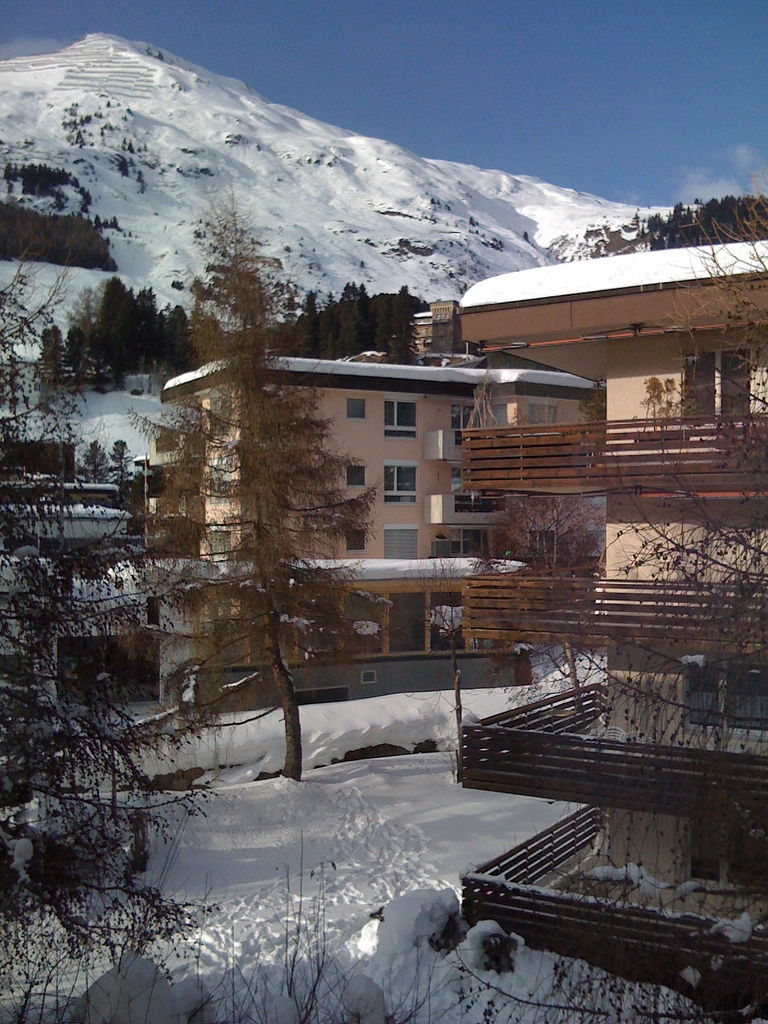
pbumpJanuary snow in Davos.
People like to mock the World Economic Forum’s annual gathering at Davos. There are many reasons to do so — the exclusivity, the overt pandering to the plutocracy, jealousy about who’s received an invitation. Every year, it seems, there’s some variant on this Guardian article, decrying the self-interestedness of the attendees. Aditya Chakrabortty suggests that what makes Davos fascinating is that it’s “the most perfect case study of how the practitioners of free-market, globalized capitalism give the public one explanation for what they are doing and why, while privately pursuing the complete opposite.”
With that context, an update from the WEF. A report commissioned for this year’s gathering reinforces that the world needs immediate and massive investment in the effort to halt climate change. From Reuters:
The world must spend an extra $700 billion a year to curb its addiction to fossil fuels blamed for worsening floods and heat waves and rising sea levels, a study issued by the World Economic Forum (WEF) showed on Monday. …
The Green Growth Action Alliance, which compiled the study on behalf of the WEF, said the extra spending was needed to promote other forms of energy generation and greater efficiency in sectors including building, industry and transport.
The $700 billion, part of which would promote cleaner energies such as wind, solar or hydro-power, would be on top of about $5 trillion projected to be spent each year on infrastructure under a scenario of business as usual until 2020.
The report includes an enticement for Davos attendees: more public investment means more opportunity for private investment.
The study said a $36 billion annual rise in global public spending to slow climate change — less than the estimated $50 billion cost of damage by Superstorm Sandy in the United States in October — could unlock far greater private investment.
It suggested a $36 billion jump in state spending to $126 billion a year, from a current $90 billion, might trigger $570 billion from private investors if properly managed.
By that math, a total investment of $14 trillion would be needed to ensure long-term growth between now and 2030, the Independent notes.
(An aside: I’ve been to Davos; my wife used to work for the WEF. This time of year, the town is usually buried in snow. Given the relationship between heat and acceptance of climate change, maybe the Forum should move this meeting to Dubai.)
The Independent also isolates an interesting argument from the report.
It is better to try to pre-empt events like Hurricane Sandy, which cost $50bn, by keeping a lid on global warming, concluded the report, researched by the Accenture consultancy.
Contrast that with reality. This morning, Christopher Mims noted on Twitter a Bloomberg article in which Verizon noted that its earnings in 2012 declined more than expected. The article includes this line:
Fourth-quarter earnings fell to 45 cents a share, excluding one-time costs such as 7 cents in expenses from Superstorm Sandy, the New York-based company said today in a statement.
To which Mims replied:
Funny how Wall Street reports Sandy as a “one-time costs.” When does extreme weather become business as usual? bloomberg.com/news/2013-01-2…
— Christopher Mims (@mims) January 22, 2013

pbumpThe Alps above Davos.
That the Davos report suggests we treat events like Sandy not as aberrations but as an inevitability is a step in the right direction, certainly. It remains to be seen if taking such action might be too late, as we’ve noted before. In an opinion piece posted today by the Times, Thomas Lovejoy notes that the opportunity for robust investment to halt climate disaster — and its concomitant economic damage — may have already passed:
At current global warming of 0.8-0.9 degrees, the fingerprints of climate change can be seen virtually everywhere in nature. The coniferous forests of western North America are currently experiencing massive tree mortality because climate change has tipped the balance in favor of native bark beetles. The Amazon seems to be edging close to dieback in the southern and southeastern portions of the great forest.
At essentially double that current temperature increase, there undoubtedly will be massive extinctions and widespread ecosystem collapse. The difficulty of trying to buffer and manage change will increase exponentially with only small increments of warming.
“Unless pressing issues of the biology of the planet and of climate change generated by greenhouse gas emissions are addressed with immediacy and at appropriate scale,” Lovejoy concludes, “the matters that occupy Davos discussions will be seen in retrospect as largely irrelevant.” Lovejoy means the broader discussion at Davos, but he might as well be speaking of this report.
One of the main obstacles to taking action is sitting in the Congress Center at the heart of Davos: the global economic leaders who are the intended audience for the WEF report. To Chakrabortty’s point, business leaders are experts at nodding along with bad news and demands for action while quietly undermining any efforts by their companies to actually do anything. That attitude is the Verizon attitude: Something bad happened once. Long-term investments will be modest, lest they further affect the bottom line.
The chair of the group that commissioned the report was former Coca-Cola executive and president of Mexico Felipe Calderon, a plutocrat’s plutocrat. In retirement, it has never been easier for Calderon to advocate this investment. I’m curious if he would have done so in either of his previous roles — and if the people in those roles now have any interest in doing so. Davos is hailed as an opportunity for the world’s leaders to meet and discuss how to move society forward. What people outside the remote mountain town see isn’t that. They see obstruction; they see the powerful sharing tips on preserving dominance. It’s an unfair shorthand, but an understandable one. If WEF wants to counteract that impression, it’s incumbent on its members to actually lead on climate change, to advocate for that $14 trillion in investment.
This morning, Andrew Ross Sorkin outlined some of the more notorious missed predictions to come from the Davos gathering — most notably, predictions about the health of the global economy in 2008. The report issued yesterday is almost certainly accurate. It’s a far stronger indictment of Davos to suggest that attendees don’t take action on obvious threats than that they misread the threats in the first place.



